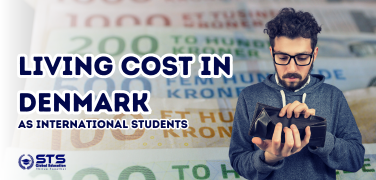- Introduction:
Denmark, a Scandinavian jewel recognized for its gorgeous landscapes, progressive society, and world-class education system, has become a sought-after destination for international students seeking academic achievement as well as a one-of-a-kind cultural experience. As the country opens its doors to a varied range of students from around the world, it is critical to investigate and comprehend the subtleties of living costs. Navigating Denmark’s financial landscape is critical for overseas students to confidently embark on their educational path and ensure a harmonious blend of academic interests and comfortable living. In this essay, we will look at the various aspects of living costs for international students in Denmark, throwing light on the important factors that determine their financial environment while studying in this welcoming Scandinavian country.
- Accommodation Costs:
An important part of an international student’s financial preparation in Denmark is covering their housing expenses. Denmark provides several housing options, each with a corresponding price range, such as individual rentals, shared apartments, and student residences. Rental costs are typically greater in larger cities with significant demand, such as Copenhagen than in smaller towns. Popular options that promote a sense of community among international students are shared housing or university-managed dorms. Although the price of housing varies according to location and amenities, students must set aside a significant proportion of their budget to ensure that they have a pleasant place to live. International students need to comprehend the range of housing alternatives and related costs to make well-informed decisions and guarantee a pleasant living experience in Denmark.
- Utilities and Internet:
In addition to finding housing, overseas students studying in Denmark also need to budget for internet and electricity bills. The expense of living is greatly increased by these necessities, which include heating, water, power, and internet access. Seasonal variations in utility costs—which might be more expensive in the winter—underline the significance of careful budgeting. Furthermore, Denmark’s dedication to sustainability is frequently reflected in eco-friendly behaviors that lower utility expenses. A dependable internet connection is essential for today’s students, and they should plan for a strong and effective connection. Overseas students must comprehend and include these utility and internet expenses in their budgets to guarantee that they can sustain a cozy and connected way of life during their time studying in Denmark.
- Food and Groceries:
For international students, navigating Denmark’s food scene is both a gourmet adventure and a budgetary consideration. Various factors, including dietary preferences, shopping habits, and whether or not to cook at home, might affect the cost of food and groceries. Even while dining out at Danish restaurants and cafes can be costly, especially in cities, students can effectively manage their budget by shopping locally and preparing meals at home. Denmark’s broad and high-quality culinary alternatives allow students to indulge in Scandinavian cuisine while remaining frugal. Although the price of housing varies according to location and amenities, students must set aside a significant proportion of their budget to ensure that they have a pleasant place to live. Budgeting for groceries and meals is an important component of financial preparation since it allows international students to strike a balance between enjoying the local flavors and remaining fiscally responsible during their academic stay in Denmark. International students need to comprehend the range of housing alternatives and related costs to make well-informed decisions and guarantee a pleasant living experience in Denmark.
- Transportation:
Denmark’s transportation system is a well-orchestrated symphony that balances efficiency, sustainability, and accessibility. The country’s public transportation infrastructure is well-known for its dependability, and it comprises a wide network of trains, buses, and bicycles, making it easy for both native and international students to travel throughout the country. Cities with designated bike lanes and a sophisticated bike-sharing system, such as Copenhagen, are particularly bike-friendly. The Danish dedication to sustainability may be seen in their public transportation, which is frequently fueled by renewable energy sources. For cost-effective and ecologically friendly commuting, students can purchase public transportation passes or purchase a bicycle. International students who use the Danish transportation system not only receive easy access to their educational institutions but also contribute to the nation’s eco-conscious culture, boosting their overall experience in Denmark.
- Health Insurance:
The health insurance system in Denmark represents the country’s dedication to providing comprehensive and accessible healthcare to all people, including overseas students. Students must have health insurance coverage during their stay as a legal obligation. The Danish healthcare system is based on the universality concept, which ensures that everyone has equal access to medical treatments. International students are often enrolled in the national health insurance program, which covers a variety of medical expenses such as doctor visits, hospital stays, and prescription drugs. This system not only promotes the well-being of all individuals, but it also provides international students with a sense of confidence, knowing that they will have solid healthcare support during their academic experience in Denmark. Understanding the complexities of the health insurance system is critical for students to properly handle their healthcare needs and focus on their education with peace of mind.
- Social Activities and Leisure:
Social activities and recreational interests are an important part of an international student’s life in Denmark. Denmark, known for its cultural diversity and strong arts scene, provides several chances for students to participate in social and leisure activities. There is no shortage of options for students to unwind and have memorable experiences, whether they are discovering the historic beauty of Copenhagen, attending cultural events, or enjoying outdoor activities in magnificent surroundings. While certain activities and places have a fee, many cultural experiences are free or heavily cheap for students. Allocating a portion of the budget to social and leisure activities is more than simply a form of amusement; it’s an important part of adopting the Danish way of life and cultivating a sense of community throughout your academic stay in this warm Scandinavian country.
- Miscellaneous Expenses:
Miscellaneous charges, which include unforeseen and supplemental costs, are an important element of the financial environment for international students in Denmark. Aside from tuition, housing, and everyday necessities, students should budget for textbooks, study tools, and potential extracurricular activities. While these charges may appear insignificant, they can soon add up and influence the entire budget. Setting aside money for unforeseen expenses is a wise financial approach that allows students to respond to unanticipated demands and opportunities that may improve their academic and personal experiences. Bank fees for foreign transactions or currency exchange can add up, so students should set aside money for social and cultural activities that support Denmark’s thriving cultural landscape. Miscellaneous expenses may also include purchases of clothing and personal belongings, particularly if adjusting to Denmark’s climate. Being aware of these prospective expenditures allows for a more thorough financial strategy, resulting in a more enjoyable and smoother path for international students pursuing their academic aspirations in Denmark.
In conclusion, a comprehensive and financially sustainable academic experience requires an awareness of and ability to navigate Denmark’s living expenses for overseas students. Student financial literacy enables them to plan and make wise choices regarding everything from housing and utilities to food, transportation, health insurance, and other incidentals. Denmark provides a special and fulfilling atmosphere for international students with its high level of living, rich cultural diversity, and top-notch educational system. Students can guarantee a peaceful and happy stay in Denmark, where academic brilliance meets with a lively and inclusive cultural experience, by being proactive with their budgets, assiduously adhering to local customs, and placing a high priority on financial planning.




